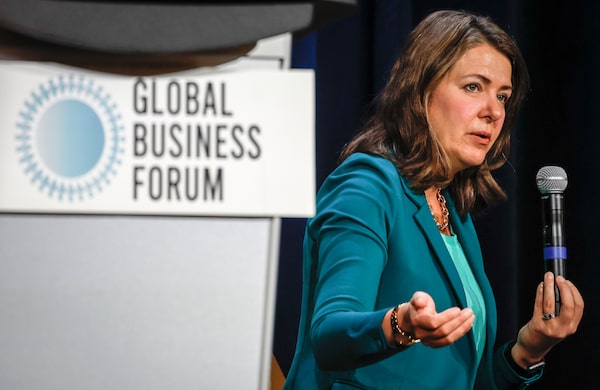
Alberta Premier Danielle Smith speaks to business leaders at the Global Business Forum in Banff, Alta., on Sept. 22. Smith told the conference that despite her concerns with the federal Liberal government there was some cabinet ministers she can work with.Jeff McIntosh/The Canadian Press
Martin Olszynski is a law professor at the University of Calgary.
“Tell the Feds,” says the Government of Alberta’s recent $8-million ad campaign opposing federal clean electricity rules. If you’re a resident of Alberta, Saskatchewan, Ontario or Nova Scotia, you’ve likely heard or seen them.
Who could disagree with statements like “No one wants blackouts. What Canadians want is reliable and affordable power”? Nor does anyone want “to freeze in the dark.”
These messages seem sound, but they are grossly exaggerated if not outright false. Independent experts have already debunked the campaign’s central claims. With some effort and planning, the transition to a cleaner power grid could actually save Canadians hundreds of dollars in power bills annually, all while providing reliable and climate-friendly electricity.
But in this misinformation age, even the most engaged citizens will struggle to stay on top of the continuous need for fact-checking and claim-debunking. Instead, Canadians should consider a government’s policy track record as a handy shortcut – especially when that government wraps its arguments in feasibility, affordability and protecting the public purse. Alberta’s actual track record undermines each and every one of these arguments.
Alberta insists that carbon capture and storage (CCS) for natural gas power isn’t feasible under the proposed federal clean electricity rules. But it is clamouring for the federal government to spend billions on the same technology in the oil sands, where industry insists it’s proven and reliable. So much for infeasibility!
Alberta says Ottawa’s clean electricity rules will lead to unaffordable power, but the province’s own electricity market is so dysfunctional that it has the most expensive electricity in the country, the predictable – and predicted – result of market power being concentrated among a handful of companies. So much for affordability!
In fact, you may recall that Alberta had a booming solar and wind business, which was undoubtedly tempering some of that market power concentration, until Premier Danielle Smith shut it down this past summer. In announcing a public inquiry and accompanying six-month moratorium, the government expressed grave concern about the future cleanup costs of renewable energy projects. Meanwhile, the oil and gas sector’s cleanup costs sit at more than $100-billion officially – with internal regulator estimates as high as $260-billion – and calls for meaningful reform are systematically ignored (to say nothing of any kind of inquiry or moratorium).
How much money has the province required the oil and gas industry to set aside for this cleanup? Roughly $1.3-billion, or 1 per cent of what is needed. The province has even mused about giving companies royalty holidays on future production if they clean up some wells, even though doing so is already a legal obligation. So much for the public purse!
Worse still, this state of affairs is no accident. A recent paper from the University of Calgary School of Public Policy, of which I was a co-author, makes painfully clear that this massive regulatory failure is the predictable consequence of decades of policy choices that consistently put the oil and gas industry’s desire to minimize its costs above the public interest in cleaning up wells and related infrastructure.
The same approach has stalled progress on greenhouse gas emissions as well. Despite repeated commitments over almost two decades, Alberta’s oil sands are still 35 per cent more GHG-intensive than average oil production globally. And while most provinces’ emissions have declined since 2005, Alberta’s have risen by 19 per cent, making them the highest among all provinces and territories – by a wide margin.
So of course Alberta’s Premier opposes federal clean electricity rules – and will oppose an oil and gas GHG emissions cap if and when it is announced. When a provincial government appears intent on picking up the tab on hundreds of billions of the sector’s cleanup liabilities, with the potential to double, triple or quadruple Alberta’s current debt of $80-billion, it’s no surprise that same government is unwilling to impose the costs associated with meaningful climate regulation – and will oppose such efforts from others.
Viewed this way, the “Tell the Feds” campaign isn’t about feasibility, affordability or reliability, but rather a thinly disguised attempt to enlist ordinary Canadians in Alberta’s unyielding service to the fossil fuel industry. But as year after year of extreme weather and fire seasons have made clear, climate inaction and delay come with their own significant – sometimes immeasurable – costs for the rest of us. Canadians would be justified in telling Alberta those are costs they’re no longer willing to bear.